Ziggurat review: A magical first-person Roguelike for Xbox One and Windows
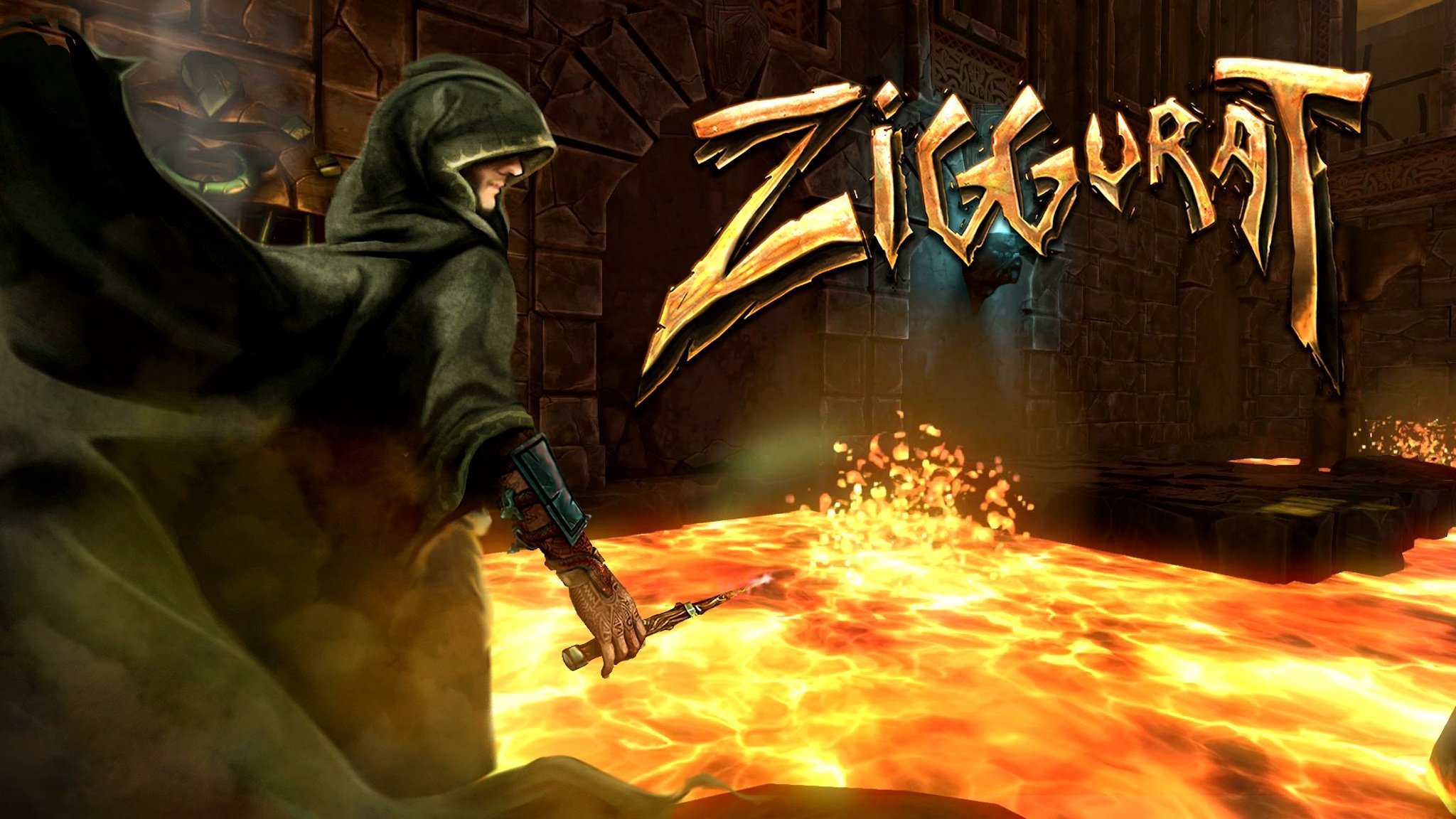
Thanks to the existence of several standout titles like Rogue Legacy, Binding of Isaac, and Crypt of the NecroDancer, the Roguelike genre has exploded in popularity over the last couple of years. Characterized by randomly generated levels, the inability to continue when you die, and minimal room for error, games in the genre are addictive and tough to master. Although Rogue Legacy has been announced for Xbox One, Microsoft's console has long been without a Roguelike – until now.
Ziggurat comes to Xbox One and Windows from Spanish developer Milkstone Studios, who started out making numerous XBLIG titles for Xbox 360. Their first ID@Xbox release is a magic-themed first-person shooter in the vein of classic FPS Hexen. It also happens to be an FPS Roguelike, of which there are very few games so far.
Can Ziggurat's wizardly appeal and addictive randomness overcome a few technical issues and sometimes unfair difficulty? Read our full review with video find out!
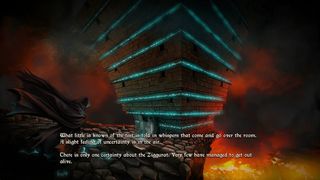
Wizards go into the Ziggurat, but they don't come out
Ziggurat is really light on story, with a text-heavy and very poorly animated introduction (that cape!) setting the stage and a number of collectible story scrolls filling in a bit of backstory as you play.
The actual concept is fairly intriguing and fits the game like a glove, though. An order of magicians tests its apprentices by sending them into a vast ziggurat (a pyramid-like building) filled with monsters and mystery. What lies at the heart of the ziggurat? It will take many attempts to find out!
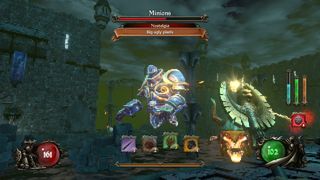
First-person Roguelike
Ziggurat's Roguelike traits include:
- Randomly generated dungeon layouts, so every playthrough is different
- A large number of helpful and harmful upgrades and items to discover
- Shrines that randomly provide blessings or curses when used
- Permadeath: no continuing, and no permanent upgrades
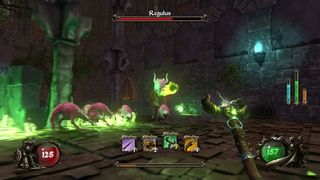
You could say those same things about most Roguelikes, but those games don't use a first-person perspective. And how many first-person shooters have you played that don't feature guns as their primary weapons?
Get the Windows Central Newsletter
All the latest news, reviews, and guides for Windows and Xbox diehards.
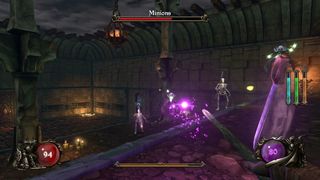
Wizardly combat
As a wizard in training, your character starts out with a wand instead of a gun. Squeezing the Right Trigger fires a single bolt of energy, while holding it will fire continuously. The Left Trigger fires multiple bolts at once. Using the wand consumes energy, which steadily refills when you stop firing. The wand's refilling mechanic feels different enough from a typical FPS default gun since you never need to reload or pick up ammo for it.
You can't entirely rely on the wand because it does relatively little damage and temporarily stops working when its mana depletes. Thankfully our wizard can carry three additional weapons at once, each of which draws from a differently colored mana reserve. But those mana reserves require crystals to recharge, dropped from enemies or found in chests.
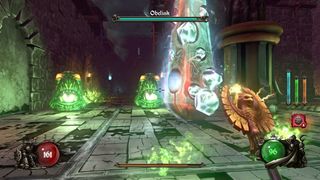
The extra weapons found in the Ziggurat include spellbooks, staves, and alchemic weapons. The latter category includes magic-enhanced guns and grenades and tends to include slow fire/high damage weapons. All have secondary fire capabilities like the wand.
You don't start with these weapons but can randomly find them throughout each run. Only one of each type can be equipped at once, so you might need to leave behind old weapons for superior ones.
Amulets are the final type of equippable item, and must be found throughout a run. These can boost health or mana recovery, stun enemies, and much more. Killing enemies will recharge your amulet after use.
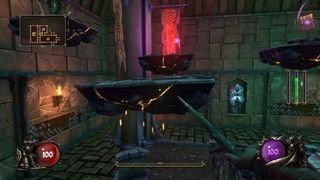
Ziggurat structure
The Ziggurat is composed of five floors. Each floor contains a variety of randomly-selected rooms for wizards to explore. Some rooms house items, some traps, and others platforming challenges. Those 3D platforming challenges can be quite fun, when they're not too tough. Modern FPS games don't tend to use a lot of floating platforms and less reality-based level designs.
Many rooms just house minions for our hero to defeat. The enemies spawn in out of nowhere and head straight for the player, similar to the Serious Sam games. As you kill the minions, a meter at the top depletes. Once it runs empty, the enemies stop coming and you're free to move on. Personally, I'd like to see the name of the enemy I'm shooting as well. But you can at least check their names in the game's Extras menu.
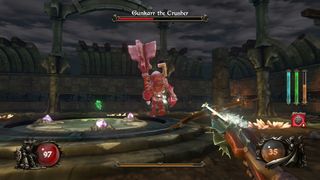
Each floor culminates in a fight against one of several possible giant bosses. Before you can actually fight the boss, you'll have to find a Portal key located somewhere throughout the level. You don't have to explore the rest of the floor once you've located the key and boss, but you'll gain valuable XP and perhaps a useful item or two.
Every floor also has a single hidden room to find, indicated by a cracked wall. I can usually find the secret room in the first floor, but rarely in the others.
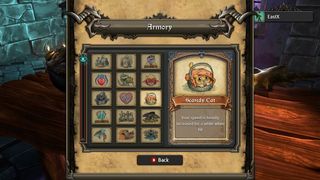
Perks, items, and characters
Most enemies drop yellow knowledge gems when killed. Grab these to fill your experience meter at the bottom of the screen and eventually level up. Every time you level up, you get to select from two perks (sometimes three) that will stick with your character for the remainder of that run. Selecting the right perks can make a big difference in your ability to survive the challenges of the Ziggurat.
You start with only a handful of the game's 100+ perks, weapons, and amulets unlocked. When you complete a run (by winning or dying), you'll usually unlock one or more new perks and items. You don't get to start out with them or anything; they just get mixed into the pool of things you can find in subsequent runs. Ziggurat never explains the conditions for unlocking perks and items, nor does its Wiki, unfortunately.
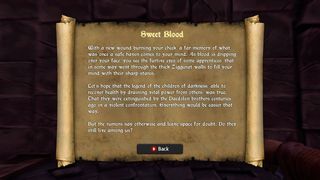
Characters are the other major unlockable. You start with only the Apprentice, but 11 more characters can be unlocked by reaching milestones in enemies killed and damage dealt. The unlockable characters are more or less effective with wands and other weapons, start with unique perks, or have more or less life than others.
Ziggurat's metagame is probably its weakest point compared to Rogue Legacy and NecroDancer. You can't get any permanent upgrades or buy anything between runs, preventing the runs from feeling as connected as they should. The best Roguelikes get easier as players unlock new content and upgrades. But the perks and items you unlock don't necessarily make things that much easier here since you're not guaranteed to actually find them during a run.
Achievements
It will take many, many runs to unlock Ziggurat's 37 Achievements. Simply unlocking all 12 characters takes long enough, and then beating the game with each character adds another 11+ hours on top of that.
The harder Achievements include beating the game without leveling up, beating it on Normal in less than 45 minutes, and beating it on Hard difficulty. At least those last two are the only ones that can't be done on Easy difficulty.
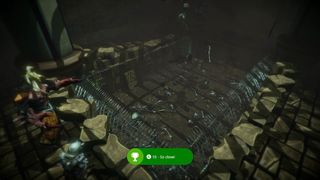
Tough but rewarding
Ziggurat doesn't make difficulty selection very obvious; you have to press the Y button at the character select screen to change it. If you want to enjoy the game, I highly recommend playing on Easy. On Normal or above, one tough room can torpedo a good run. Oftentimes enemy shots are too tough to dodge, and health refills can be scarce. Turning it down to Easy will lessen the frustration of unfair encounters.
Although Ziggurat lacks a strong metagame and it sometimes suffers from difficulty issues, it's still one of the most enjoyable ID@Xbox games I've played. The magical atmosphere, otherworldly color scheme, and randomized floor layouts create a highly compelling experience. If you enjoy challenging games like Dark Souls and Spelunky, Ziggurat will easily cast a spell on you.
- Ziggurat – Xbox One – 1.1 GB – $14.99 – Xbox.com Link
- Ziggurat – Windows, Mac, and Linux – $14.99 – Steam Link
Paul Acevedo is the Games Editor at Windows Central. A lifelong gamer, he has written about videogames for over 15 years and reviewed over 350 games for our site. Follow him on Twitter @PaulRAcevedo. Don’t hate. Appreciate!
